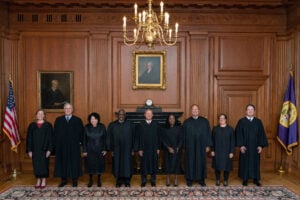
When Pork Comes To Shove, It Isn’t Always Easy To Know Why A Thing Is Constitutional

(Photo by Collection of the Supreme Court of the United States via Getty Images)
Dollar for dollar, I wager that the weirdest thing about the Supreme Court isn’t discussed all that often. No, not the issue that a justice being gifted under the table for 20 years poses for the rule of law or the if external accountability for the Supreme Court is actually a separation of powers issue. As interesting as they are, I’d consider them to be bad housekeeping more than issues proper to the institution. The weirdest thing about the Supreme Court is that even the absolute arbiters of what the Constitution means can have internal disagreements over what things are limited, mandated, and why. It is easy to see in big discussions over the limits of war powers and the like, but it pops up just as readily over something as mundane as what’s on your dinner plate. From Slate:
googletag.cmd.push( function() { // Display ad. googletag.display( "div-id-for-top-300x250" ); });On Thursday, the Supreme Court handed down National Pork Producers v. Ross, upholding a California law that bans the sale of pork from pigs subjected to torture. On the surface, National Pork is a 5–4 victory for animal welfare laws like California’s, which regulate in-state sales in a way that affects other states’ markets. It’s certainly a victory for federalism, giving states broad leeway to experiment with more humane requirements for livestock. But it’s also a huge mess. Despite the clear bottom line—pig torture loses—the justices fractured on key questions; the five justices in the majority couldn’t even agree on why California’s law is constitutional. The three liberals even fissured, with Justice Ketanji Brown Jackson siding with a trio of conservatives in dissent.
 Sponsored The Ultimate Guide To eDiscovery With Google Workspace And Google Vault An effective team must be well-equipped to handle the unique challenges these tools present. From Onna and Above The Law
Sponsored The Ultimate Guide To eDiscovery With Google Workspace And Google Vault An effective team must be well-equipped to handle the unique challenges these tools present. From Onna and Above The Law Part of the confusion — which begets more room for confusion — is that the part of the Constitution implicated in the case is more implied than you know… actually written on the paper. It’s not quite one of those penumbras and emanations a la Griswold, its more the contrapositive of the Commerce Clause:
The Constitution’s commerce clause gives Congress authority “to regulate commerce … among the several states.” From this text, the Supreme Court has gleaned the principle that states may not regulate commerce beyond their borders, since that’s a task for Congress alone. The court calls this the “dormant” commerce clause. Most of California’s pork originates in pig-producing states like North Carolina and Iowa; out-of-state producers will have to adapt to California’s new standards if they want to keep selling there. The pork industry asserts that because Proposition 12 effectively regulates other states’ pig farms, it runs afoul of the dormant commerce clause.
googletag.cmd.push( function() { // Display ad. googletag.display( "div-id-for-middle-300x250" ); }); googletag.cmd.push( function() { // Display ad. googletag.display( "div-id-for-storycontent-440x100" ); }); googletag.cmd.push( function() { // Display ad. googletag.display( "div-id-for-in-story-youtube-1x1" ); });Now that the background stuff is cleared, here’s where it got fun. As much as we like to think that the law and judgments concerning it are neutral, black and white, or some other shorthand for not whatever some person in a black robe feels like at the moment… sometimes it really does make more sense to think of the law as something like that when it comes to the Supreme Court. Not just in the practice of living life outside of the Court’s halls (had to get another dig in at Justice Thomas), but also when it comes to the minutia of doing the job:
The trouble began when Gorsuch turned to the industry’s final theory, which involves something called “Pike balancing.” This test, derived from a 1970 decision, directs court to assess the “burden” that a law imposes on interstate commerce. If the burden is “substantial,” then a court must ask whether it is “clearly excessive in relation to” its in-state benefits…Only Barrett and Thomas, however, joined this section of Gorsuch’s opinion. Sotomayor and Kagan refused to kill off Pike. Instead, they joined the next section of the opinion, in which Gorsuch begrudgingly applied Pike balancing and found that Proposition 12 passed muster. He explained that California’s law will merely trigger “a shift from one set of production methods to another,” and the market will adjust accordingly. Maybe in-state producers will take a bigger share of the California pork market, or some out-of-state competitors will adapt more quickly than others. No matter what, these “burdens” on interstate commerce are not “substantial” enough to trigger Pike balancing. (In a brief concurrence, Sotomayor, joined by Kagan, wrote separately to reaffirm that Pike remains good law.)
Sponsored Sponsored The Ultimate Guide To eDiscovery With Google Workspace And Google Vault An effective team must be well-equipped to handle the unique challenges these tools present. From Onna and Above The Law
Sponsored The Ultimate Guide To eDiscovery With Google Workspace And Google Vault An effective team must be well-equipped to handle the unique challenges these tools present. From Onna and Above The Law  Sponsored Making History With Shepard’s Citations From Ethan Beberness
Sponsored Making History With Shepard’s Citations From Ethan Beberness  Sponsored ChatGPT Draws State Lawmakers’ Attention To AI ChatGPT and other AI models have drawn a great deal of public attention since being introduced last year—state lawmakers are taking notice too. From Korey Clark, Editor, State Net Capitol Journal™
Sponsored ChatGPT Draws State Lawmakers’ Attention To AI ChatGPT and other AI models have drawn a great deal of public attention since being introduced last year—state lawmakers are taking notice too. From Korey Clark, Editor, State Net Capitol Journal™  Sponsored ChatGPT Draws State Lawmakers’ Attention To AI ChatGPT and other AI models have drawn a great deal of public attention since being introduced last year—state lawmakers are taking notice too. From Korey Clark, Editor, State Net Capitol Journal™
Sponsored ChatGPT Draws State Lawmakers’ Attention To AI ChatGPT and other AI models have drawn a great deal of public attention since being introduced last year—state lawmakers are taking notice too. From Korey Clark, Editor, State Net Capitol Journal™ This case acts as a cool introduction to how types of thinking can influence how people, robed or not, come to conclusions that some find common sense and others find bewildering. Take, for example, how Justice Jackson’s decision would fall in line with generally accepted progressive expectations of how Congressional authority ought play out. Who knew a case about the just treatment of pigs could lay bare how the justices think?
The Supreme Court’s Pork Decision Fractured the Justices in the Weirdest Way Possible [Slate]
googletag.cmd.push( function() { // Display ad. googletag.display( "div-id-for-bottom-300x250" ); }); Chris Williams became a social media manager and assistant editor for Above the Law in June 2021. Prior to joining the staff, he moonlighted as a minor Memelord™ in the Facebook group Law School Memes for Edgy T14s. He endured Missouri long enough to graduate from Washington University in St. Louis School of Law. He is a former boatbuilder who cannot swim, a published author on critical race theory, philosophy, and humor, and has a love for cycling that occasionally annoys his peers. You can reach him by email at [email protected] and by tweet at @WritesForRent.
Chris Williams became a social media manager and assistant editor for Above the Law in June 2021. Prior to joining the staff, he moonlighted as a minor Memelord™ in the Facebook group Law School Memes for Edgy T14s. He endured Missouri long enough to graduate from Washington University in St. Louis School of Law. He is a former boatbuilder who cannot swim, a published author on critical race theory, philosophy, and humor, and has a love for cycling that occasionally annoys his peers. You can reach him by email at [email protected] and by tweet at @WritesForRent.
 Sponsored Lex Machina Expands The Power Of Legal Analytics To Litigation In State Courts Lex Machina expands its powerful machine learning, trained and reviewed by attorneys, to help legal practitioners make data-driven decisions in state courts as well as… From Ethan Beberness
Sponsored Lex Machina Expands The Power Of Legal Analytics To Litigation In State Courts Lex Machina expands its powerful machine learning, trained and reviewed by attorneys, to help legal practitioners make data-driven decisions in state courts as well as… From Ethan Beberness  Sponsored Why CRM Is An Essential Tech Tool For Law Firms In 2023 CRMs are powerful tools to help law firms grow and scale without needing more staff. Read on for a brief overview of the basic benefits… From Jan Hill - Lawmatics Topics
Sponsored Why CRM Is An Essential Tech Tool For Law Firms In 2023 CRMs are powerful tools to help law firms grow and scale without needing more staff. Read on for a brief overview of the basic benefits… From Jan Hill - Lawmatics Topics Courts, Jurisprudence, National Pork Producers v. Ross, Pigs, SCOTUS, Supreme Court, Torture
ES by OMG
Euro-Savings.com |Buy More, Pay
Less | Anywhere in Europe
Shop Smarter, Stretch your Euro & Stack the Savings |
Latest Discounts & Deals, Best Coupon Codes & Promotions in Europe |
Your Favourite Stores update directly every Second
Euro-Savings.com or ES lets you buy more and pay less anywhere in Europe. Shop Smarter on ES Today. Sign-up to receive Latest Discounts, Deals, Coupon Codes & Promotions. With Direct Brand Updates every second, ES is Every Shopper’s Dream come true! Stretch your dollar now with ES. Start saving today!
Originally posted on: https://abovethelaw.com/2023/05/when-pork-goes-to-shove-it-isnt-always-easy-to-know-why-a-thing-is-constitutional/